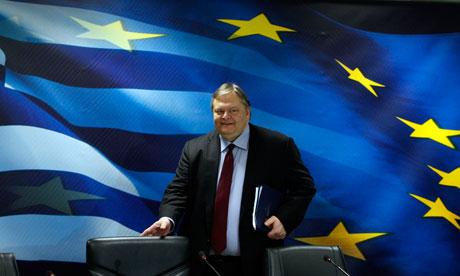David Gow in Brussels guardian.co.uk, Tuesday 21 February 2012 19.59 GMT
Scale of cuts required to implement rescue package prompted analysts to raise spectre of another debt crisis later this year
Greek finance minister Evangelos Venizelos arrives at a news conference in Athens. Photograph: Thanassis Stavrakis/AP
Greeks will suffer austerity measures for another five years as the price of their government securing a €130bn (£109bn) bailout to prevent national bankruptcy and chaos within the eurozone, it has emerged.
The scale of the wage and spending cuts required to implement the rescue package prompted an array of analysts to raise the spectre of yet another Greek debt crisis later this year and the country's exit from the euro as recession deepens.
But Olli Rehn, the EU economic and monetary affairs commissioner, said Greece had lived beyond its means for a decade and savage cuts in labour costs were vital to restore competitiveness and growth.
The Greek prime minister, Lucas Papademos, and finance minister Evangelos Venizelos talked up the agreement, reached after 14 hours of talks at 5am on Tuesday, as "avoiding a nightmare scenario."
José Manuel Barroso, the European commission president, said the deal "closes the door on an uncontrolled default, with all its economic and social implications that would mean chaos for Greece and the Greek people." The deal helped push the Dow Jones index in New York over 13,000 for the first time in almost four years.
Senior EU officials admitted, that, after enduring wage cuts of 30% since 2009, Greeks would suffer a further 15% reduction in the next three years and even more cuts would be required after that.
The country's economy, which contracted by 7% last year, is forecast to decline by a further 4.5% this year, stagnate in 2013 and then grow by 2% in 2014. But officials conceded that the Greek rescue programme is "accident-prone" and their forecasts are high-risk. Greece has been in recession for five years, losing 17% of its GDP.
Unemployment, now running at around 20%, is expected to remain above 18% this year and next, be just below 17% in 2014 and still be above 15% in 2015.
The Greek government has barely a week to implement tough "prior actions" to release the next tranche of loans enabling it to pay €14.4bn of debt by March 20 and securing final eurozone approval for the second bailout within less than two years.
These include legislation to set up a blocked account to ensure that EU/IMF loans are used to service debt, not meet current spending on health, pensions and the like.
Thereafter, subjected to unprecedented budgetary surveillance by an increased posse of inspectors and advisers, Athens will have to find further savings equivalent to 5% of GDP by the end of 2014.
Rehn indicated this could be eased by a clampdown on tax evasion, aided by officials from other EU countries. They and others are to be permanently stationed in Athens to "further strengthen Greece's institutional capacity".
The UK government welcomed the deal. David Cameron said the next step was "constructing a firewall large enough to prevent contagion within the eurozone."
European diplomats indicated that next week's EU summit would be asked to endorse proposals to merge the lending capacity of the existing eurozone bailout fund, the EFSF, with that of the new European Stabilisation Mechanism – giving a firewall of between €650bn and €750bn.
This is short of the €1 trillion suggested by eurozone leaders last autumn or the €2trn foreseen by markets. Christine Lagarde, IMF managing director, held out for EU commitments on this firewall before committing her organisation to a contribution to the Greek bailout.
Wolfgang Schauble, the German finance minister, said, the IMF share would be just €23bn, including €10bn rolled over from the first €109bn Greek rescue package. This is short of IMF loans to Portugal and Ireland but may be a sticking point for non-euro IMF members such as Britain.
George Osborne, the chancellor, said at a meeting of all 27 EU finance ministers: "Of course resolving the Greek situation is only part of resolving the eurozone crisis but I think we took a really significant step towards that last night and it's good for Britain because resolving the euro zone crisis is the biggest boost Britain could get for its economy this year.
"The important thing about this deal is that they have tried to get Greece into a reasonable place vis-a-vis its debt sustainability. That's been the crucial missing ingredient." The deal is designed to cut Greek debt to 120.5% of GDP by 2020 from the current 160%.
This breakthrough was provided when Jan Kees De Jager, Dutch finance minister, persuaded Schauble to back a scheme for the ECB to release its profits on its holdings of Greek debt to national central banks to lend onto the EFSF.
This helped governments reduce the interest charged to Greece for its first bailout by up to 1.5 percentage points.
Private bondholders were leaned upon to accept an increased "haircut" of 53.5% on the nominal value of the Greek debt they hold – or 74% of the bonds' net present value. They agreed to avoid a "disorderly default".
But the deal could still unravel, with Jorg Kramer, Commerzbank chief economist, suggesting debt levels will rise as recession deepens and/or resumed growth falters.
Jennifer McKeown, senior European economist at Capital Economics, said there was a risk of a eurozone exit later this year because of the austerity measures, social unrest and deeper recession.
Greeks will suffer for five years as part of resolving eurozone crisis | World news | The Guardian
![The [Greek] European Tragedy](https://blogger.googleusercontent.com/img/b/R29vZ2xl/AVvXsEiWKI5s90SFm1wWTk6bs4p7CgslaC2SnYPsrZhb-B-smOufNNCSxCvpBLI9hOB-LsXZjir_PNmEiMk2-E62F3xkg96IoC6QFAaZAnPRTVH340IN9WBRmWJqPkjWlgyRj3zpALp7h6hvA58/s920/GkBack_new.jpg)
